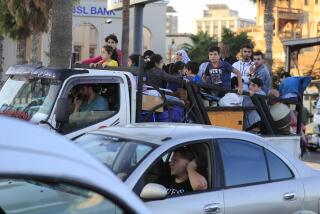In Libya, Kadafi tightens hold on Tripoli
- Share via
Reporting from Benghazi, Libya; Ras Ajdir, — Moammar Kadafi retained his grip on the Libyan capital Saturday, blocking entry to Tripoli with tanks and clearing the streets of protesters, but the strongman found himself beset by challenges to his control in the west of the country, and even his airspace.
In one of the most dramatic developments of the day, two British military aircraft daringly flew into the country to rescue 150 oil workers and others from the desert in eastern Libya, a region now held by anti-government forces, officials in London said.
Residents of Tripoli seemed stunned by the severity of the violence that had engulfed them overnight as Kadafi struggled to protect his 41-year reign in the North African country, with one merchant calling the bloodshed “beyond a massacre” and another saying that gunmen were using the cover of an ambulance to mow people down.
Hours later, state television called the reports lies and Kadafi’s son Seif Islam hosted a group of foreign journalists for a closely monitored trip meant to portray his family as in control.
“If you hear fireworks, don’t mistake it for shooting,” the younger Kadafi reportedly said. “Peace is coming back to our country.”
But his father appeared to be losing firm control of the key city of Sabratha, one of his strongholds. According to residents fleeing to Tunisia on Saturday, gunfire has been erupting regularly in the western city as anti-government unrest spreads.
“There are battles between tribes that are in support or against the government,” said Hicham Maarouf, a Moroccan house painter, who along with friends used a brief window of calm to escape the city.
Kadafi may face new threats from eastern parts of the country that have already fallen to opposition control.
In the eastern city of Benghazi, a pack of agitated young men shoved aside teenage security guards Saturday at the downtown courthouse and rampaged through the ground floor, screaming, “To Tripoli! To Tripoli! Kill Kadafi!”
Khaled Ben Ali, 49, a University of Texas graduate who calls himself the “crisis manager” of the city’s self-appointed ruling committee, said that Benghazi and another eastern city, Tobruk, had sent about 300 fighters to Tripoli to join the battle against Kadafi. Some were soldiers who once served the government, he said, but most were young street protesters.
The pressure also mounted on the diplomatic front.
President Obama and Secretary of State Hillary Rodham Clinton called on Kadafi to step down, withdrawing previous reticence to directly urge the Libyan dictator to leave office.
In a statement, Clinton said Kadafi “has lost the confidence of his people and he should go without further bloodshed and violence.” In a phone conversation with German Chancellor Angela Merkel, Obama did not cite Kadafi by name but said the Libyan leader had lost his legitimacy.
“The president stated that when a leader’s only means of staying in power is to use mass violence against his own people, he has lost the legitimacy to rule and needs to do what is right for his country by leaving now,” a White House statement said.
Meanwhile, the United Nations Security Council voted unanimously to impose sanctions punishing Kadafi and others in the ruling elite for attacks that have killed hundreds of civilians. In addition to freezing assets and imposing a travel ban on the inner circle, the council also voted to refer the case to the International Criminal Court.
In Libya, new details emerged about violence in the city of Zawiya, a key crossroads between the Tunisian border and Tripoli. Though some asserted that it was firmly under the control of the populace, others reported battles that suggested the city of 210,000 was still in play. According to witnesses, clashes erupted in the city after a Friday prayer session.
“We were praying at the mosque and afterward they started shooting,” said Mohammad Said, a 31-year-old construction worker. “It was all of a sudden. They were militiamen in red berets.”
Elsewhere Saturday, as unrest spread across the Middle East, an influential tribal chief quit Yemen’s ruling party and called for President Ali Abdullah Saleh to step down as political pressure intensified on the longtime leader.
The tribal chief, Sheik Hussein Ahmar, comes from what was once a political stronghold for the president. Until Saturday, tribal leaders had remained mostly silent about the protests roiling Yemen.
Zucchino reported from Benghazi, Daragahi from Ras Ajdir and Therolf from Cairo. Times staff writers Raja Abdulrahim in Benghazi, Bob Drogin in Cairo, Henry Chu in London and Alana Semuels in Los Angeles and special correspondent Haley Sweetland Edwards in Sana, Yemen, contributed to this report.
More to Read
Sign up for Essential California
The most important California stories and recommendations in your inbox every morning.
You may occasionally receive promotional content from the Los Angeles Times.















